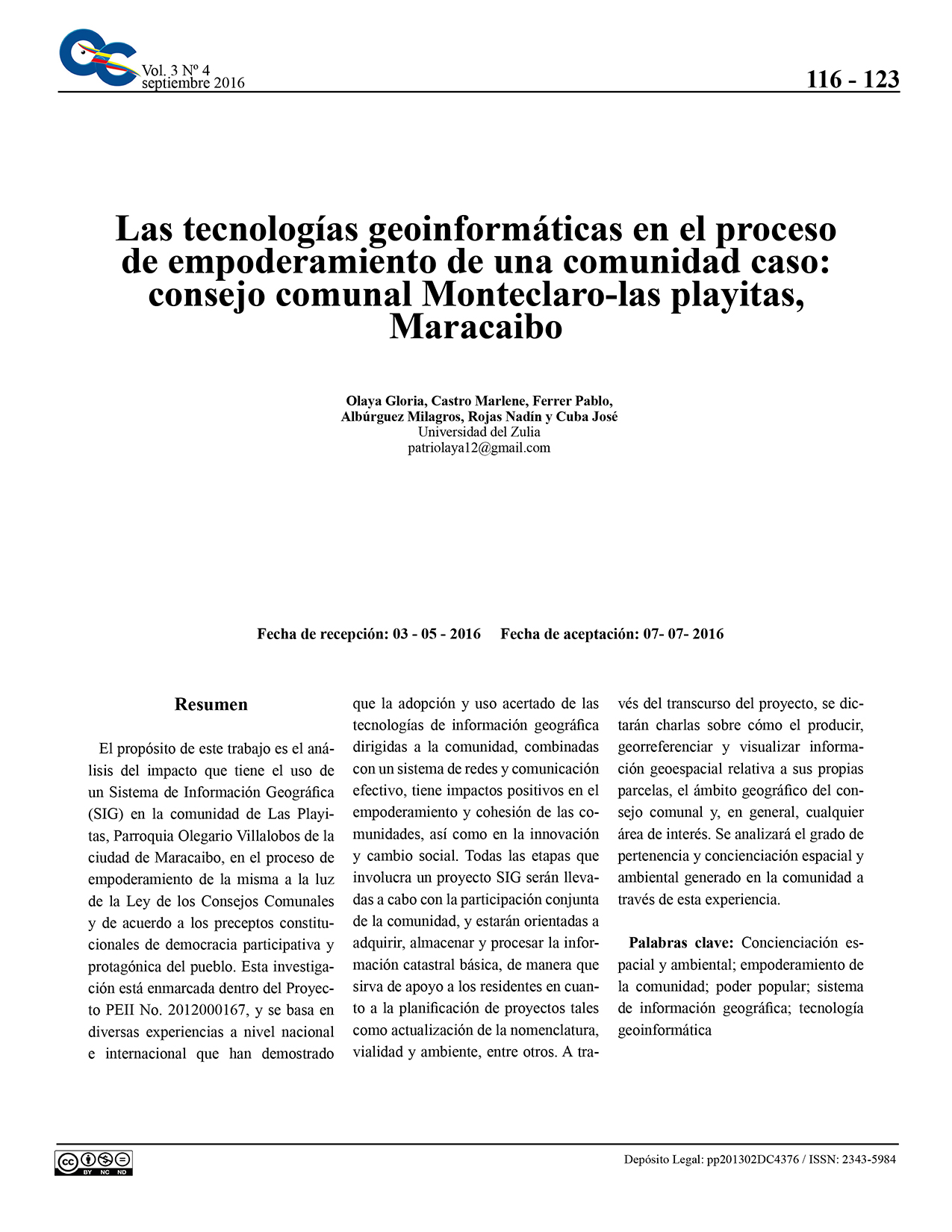Geoinformation technologies in the process of empowerment of a community case: community council monteclaro-las playitas, Maracaibo
Keywords:
Spatial and environmental awareness, empowerment of the community, popular power, geographical information system, Geoinformatics technologyAbstract
The purpose of this work is the analysis of the impact of the use of a Geographic Information System (GIS) in the community of Las Playitas, Parish Olegario Villalobos of the city of Maracaibo, in the process of empowering it to light of the Law of the Communal Councils and in accordance with the constitutional precepts of participatory and protagonist democracy of the people. This research is framed within the PEII Project No. 2012000167, and is based on diverse experiences at national and international level that have demonstrated that the adoption and successful use of geographic information technologies directed to the community, combined with a network system and effective communication, has positive impacts on the empowerment and cohesion of communities, as well as on innovation and social change.All the stages involved in a GIS project will be carried out with the joint participation of the community, and will be aimed at acquiring, storing and processing basic cadastral information, in order to support residents in project planning. such as updating the nomenclature, roads and environment, among others. Throughout the course of the project, lectures will be given on how to produce, georeference and visualize geospatial information relative to their own plots, the geographical scope of the communal council and, in general, any area of interest. The degree of belonging and spatial and environmentalawareness generated in the community will be analyzed through this experience.
Downloads
References
Asamblea Nacional de la República Bolivariana de Venezuela. Ley Orgánica de Los Consejos Comunales. Gaceta Oficial 39335 del 28 de diciembre de 2009.
Asamblea Nacional de la República Bolivariana de Venezuela. Ley Orgánica del Poder Popular. Gaceta Oficial 6.011 Extraordinario del 21 de diciembre de 2010.
Burrough, P. (1992). Possibilities and constraints of GIS applications in developing countries; GIS and the third world, pp.17-25.
Castro, M., Ferrer, P., Olaya, G., Alburguez, M., Rojas, N. y Cuba, J. (2013). Educación para el desarrollo sustentable: una necesidad para conservar la biodiversidad. Caso inglés para Ingeniería Química. LUZ-Venezuela. Memorias IV Congreso de Diversidad Biológica.
Connolly, Priscilla (2005). Mapas y democracia, reflexiones críticas sobre la georeferenciación de carencias para la programación de políticas. dialnet.unirioja.es/descarga/articulo/3288998.pdf
Decreto Presidencial No. 3390 del 28 de diciembre de 2004. Uso del Software Libre en Venezuela.
Elliott, Jhon (2000). La investigación–acción en educación. Ediciones Morata, S. L. Cuarta Edición, Madrid.
Howarth, Brad (2012). Democracy meets GIS. Government Technology Review. http://www.govtechreview.com.au/ democracy-meets-gis-2/#.Uv0qvvvYpIU
Mancebo Quintana, S.; Ortega Pérez, E.; Valentín Criado, A.C.; Martín Ramos, B.; Martín Fernández L. (2008). LibroSIG: aprendiendo a manejar los SIG en la gestión ambiental. Madrid.
Moreira-Muñoz, Andrés (2004). Herramientas para la democratización y la comprensión del entorno. Revista Ambiente y Desarrollo. Vol. XX Nro. 3, Vol. XXI Nro. 1. pp. 5.
Olaya, G., Castro, M., Ferrer, P., Alburguez, M., Rojas, N. y Cuba, J. (2013). Sustentabilidad, biodiversidad y reciclaje: experiencias desde la comunidad y la universidad. Memorias IV Congreso de Diversidad Biológica.
Olaya, Victor (2012). Sistemas de Información Geográfica, Universidad de Extremadura, Licencia Creative Commons Reconocimiento, Tomo 1.
Parisi, Domenico; Taquino, Michael; Michael Grice, Steven; Gill, Duane A. (2003). Promoting Environmental Democracy Using GIS as a Means to Integrate Community into the EPA-BASINS Approach. Society and Natural Resources, Volume 16, Number 3, pp. 15
Pickles, John (1995). Representations in an Electronic Age: Geography, GIS, and Democracy. In Ground Truth: The Social Implications of Geographic Information Systems. New York: The Guilford Press, pp. 30
Quantum GIS Development Team, (2012). Quantum GIS Geographic Information System. Open Source Geospatial Foundation Project. http://qgis.osgeo.org
Ramasubramanian, L. (1999). Nurturing Community Empowerment: Participatory Decision Making and Community Based Problem Solving Using GIs, in M. Craglia and H. Onsrud (eds.) Geographic Information Research: Trans-Atlantic Perspectives, Taylor & Francis, pp. 87-102.
Singh, A.M. (2004). Bridging the digital divide: the role of universities in getting South Africa closer to the global information society. South African Journal of information Management, Volume 6, Number 2. Pp. 9.
Zeller, Johannes (2002). GIS in developing countries: the example of improving informal settlements http://I.jhonny.de/Essays/GIS%20in%20dev.%20countries.pdf

Downloads
Published
How to Cite
Issue
Section
License

This work is licensed under a Creative Commons Attribution-NoDerivatives 4.0 International License.







